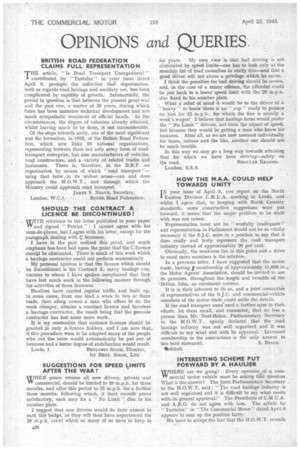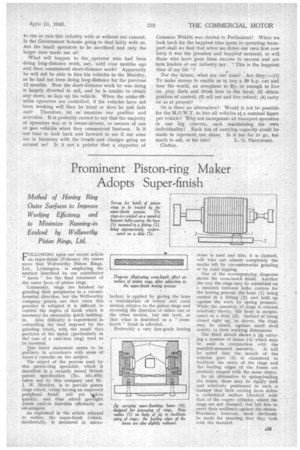OPINIONS and QUERIES BRITISH ROAD FEDERATION CLAIMS FU LL REPRESENTATION
Page 22

Page 25

If you've noticed an error in this article please click here to report it so we can fix it.
THE article, "Is Road Transport Unorganized? " contributed by " Tantalus " to your issue dated April 9, prompts the reflection thaI Organization, both as regards road haulage and ancillary use, 'has been complicated by rapidity of growth. Substantially, the period in question is that.between the present great war and the past one, a matter of 20 years, during which there has been immense technical development and not much sympathetic treatment at official hands. In the circumstances, the degree of cohesion already attained, whilst leaving much to be done, is not inconsiderable.
Of the steps towards unity, one of the most significant was the formation, in 1932, of the British Road Federation, which now links 56 national organizations, representing between them not only every form of roadtransport enterprise, but also manufacturers of vehicles, road constructors, and a variety of -related trades and businesses. There is, therefore, in the B.R.F. an organization by means of which "road transport "— using that term in its widest sense—can and does approach the M.O.W.T., and through which the Ministry could approach road transport.
JAmEs S. NEAVE, Secretary,
London, W.C.1. . British Road Federation.
SHOULD THE CONTRACT A LICENCE BE DISCONTINUED? WITH reference to the letter published in your paper TY and signed " Patriot." . I cannot agree with his nom-de-plume, but I agree with his letter, exceRt for the paragraph dealing with C licensees.
I have in the past noticed this point, and much emphasis has been laid upon the point that the C-licence should be eliminated. There is much of this work which a haulage contractor could not perform economically My personal opinion is that the licence which should be discontinued is the Contract A; many haulage con: tractors to whom I have spoken complained that they have lost much work in the following manner through the activities of these licensees.
Hauliers have carried regular traffic and built up, in some cases, from one load a week to two or three loads, then along comes a man who offers to do the work cheaper, obtains a contract licence and becotnes a haulage contractor, the result being that the genuine contractor has lost some more work.
It is my contention that contract licences should be granted ,to only A-licence holders, and I am sure that... if this procedure were to be adopted many of the people who cut the rates would automatically be put out of business and a better degree of stabilization would result.
Leeds, 1. BENJAMIN SPINE, Director, for BENJ. SPINE, LTD: SUGGESTIONS FOR SPEED LIMITS AFTER THE WAR?
VrEN peace returns all new drivers, private and crommercial, should be limited to 20 m.p.h. for three months, and after this period to 25 m.p.h. for a further three months, following which, if their records prove satisfactory, each may fix a " No Limit" disc to his number plate.
I suggest that new drivers would do their utmost to earn this badge; as they will then have experienced the 20 m.p.h. crawl which so many of us have to keep to s20
for years. My own view is that bad driving is not eliminated by speed limits—one has to look only at the monthly list of road casualties to verify this—and that a good driver will not abuse a privilege which he earns.
I think the penalties for bad driving should be severe, and, in the case of a minor offence, the offender could be put back to a lower speed limit with the 20 m.p.h. disc fixed to his number plate.
. What a relief of mind it would be to the driver of a "heavy " to know there is no " cop " ready to pounce on him for 22 m.p.h., for which the fine is usually a week's wages! I believe that haulage firms would prefer the " No Limit " drivers, not from the aspect of speed, but because they would be getting a man who knew, his business. After all, as we are now assessed individually for taxes,, rations and the like, another one should not be much trouble.
In this way we may go a long way towards attaining that for which we have been striving—safety on
the road. REGULAR READER. London, S.E.6.
HOW THE M.A.A. COULD HELP TOWARDS UNITY IN your issue of April 9, you report on the North 1 Eastern Division C.M.U.A. meeting in Leeds, and whilst I agree that, in keeping with North Country standards, some constructive suggtiens were put forward, it seems that the major problem to be dealt with was not raised.
Representation need not be "woefully 'inad'equate" and representation in Parliament Would not be so vitally necessary if the S.J.C. were in a position to say that it does really and truly represent the road transport industry instead of approximately 20 per cent.
Obviously, the weakness lies in this point and a drive to enrol more members is the solution.
In a previous letter, I have suggested that the motor trade, having membership of approximately 11,000.in the Motor Agents' Association, should be invited to use its premises, throughout the length and breadth of the 'British Isles, as enrolment centres.
It is in their interests to do so, and a joint committee of representatives of the S. J.C. and commercial-vehicle members of the motor trade could settle the details.
If the road transport user' needa further spur to their efforts, let them recall, and remember, that no less a person than Mr. Noel-Baker, Parliamentary. Secretary to the M.O.W.T., openly declared that the road haulage industry was not well organized and it was difficult to say what met with Its approval. Increased membership in the associations is the only answer to
this bold statement. A.BINNS: +Solihull.
INTERESTING SCHEME PUT FORWARD BY A HAULIER WIiERE are we going? Every operator. of a cornlnercial motor vehicle must be asking tlAt question What is the answer? The Joint Parliamentary Secretary to the M.O.W.T. said: "The road haulage industry is not well organized and it is difficult to say what meets with its general approval:" The Presidents of C.M.U.A. and A.R.O. do not agree with him. The article by " Tantalus " in "The Commercial Motor" dated April 9 appears to sum up the position fairly.
We have to accept the fact that the M.O.W.T. intends to run or ruin this industry with or without our consent. Is the Government Scheme going to deal fairly with us. Are the small operators to be sacrificed and only the larger ones made use of?
What will happen to the operator who had been doing long-distance work, 'say, until nine months ago and then comthenced short-distance work? Apparently he will nOt be able to hire his vehicles to the Ministry, as he had not been doing long-distance for the previous 12 months. Now the short-distance work he was doing is largely diverted to rail, and he is unable to obtain any more, so lays up his vehicle. When the under-GOmiles operators are controlled, if his vehicles -have not been working will they be hired or does. he just fade out? Therefore, let us' examine our position and activities. It is probably correct to say that the majority of operators was or is owner-drivers, or owners of one or two vehicles when they commenced business. Is it not time to look back and forward to see if our aims are in harmony with the treads and changes going on around us? Is it not a pointer that a supporter of
Common 'Wdalth was elected to Parliament? When we look back for the happiest time spent in operating transport shall we find that when we drove our own first new lorry it was the proudest and happiest moment, or will those who have gone from success to success and are now leaders ofour industry say "This is the happiest time of my "?
For the future, what are our aims? Are they :—(1) To make. money to enable us to buy a. 50 h.p. car and tour the world, an aeroplane to fly, or enough to live on, play darts and drink beer in the local; (2) obtain position of control; (3) sell out and live retired; (4) carry
on as at present? •
Or is there an alternative?. Would it not be possible for the M.O.W.T. to hire all vehicles at a nominal figure per vehicle? Why not incorporate all transport operators in one big concern, each maintaining his own individuality? Each ton of carrying capacity could be made to represent one share. Is it too far to go, too much to ask, or too late? L. G. PRITCHARD.
Glutton.




















































